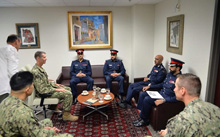 Bahrain’s small size, central location among Gulf countries, economic dependence on Saudi Arabia, and proximity to Iran require it to play a delicate balancing act in foreign affairs among its larger neighbors. The United States established diplomatic relations with Bahrain in 1971 following its independence from the United Kingdom. The U.S. embassy at Manama was opened September 21, 1971, and a resident ambassador was sent in 1974. The Bahraini Embassy in Washington, DC, opened in 1977. The American Mission Hospital has operated continuously in Bahrain for more than a century
Bahrain’s small size, central location among Gulf countries, economic dependence on Saudi Arabia, and proximity to Iran require it to play a delicate balancing act in foreign affairs among its larger neighbors. The United States established diplomatic relations with Bahrain in 1971 following its independence from the United Kingdom. The U.S. embassy at Manama was opened September 21, 1971, and a resident ambassador was sent in 1974. The Bahraini Embassy in Washington, DC, opened in 1977. The American Mission Hospital has operated continuously in Bahrain for more than a century
Bahrain plays a key role in regional security architecture and is a vital U.S. partner in defense initiatives. Bahrain hosts the U.S. Navy’s FIFTH Fleet and participates in U.S.-led military coalitions, including the Global Coalition to Defeat ISIS. Bahraini forces have supported the International Security Assistance Force in Afghanistan, providing perimeter security at a military base. Bahrain was the first Arab state to lead a Coalition Task Force patrolling the Gulf and has supported the coalition counter-piracy mission with a deployment of its flagship. The U.S. designated Bahrain a Major Non-NATO Ally in 2002.
The U.S-Bahrain Free Trade Agreement entered into force in 2006, generating additional commercial opportunities for both countries. In 2017, bilateral merchandise trade reached $1.9 billion.
Due to its relatively limited energy reserves, Bahrain has been diversifying its economy away from oil and gas production and is seeking to attract foreign investment and businesses. The U.S.-Bahrain Free Trade Agreement took effect on August 1, 2006 and has generated increased U.S. commercial interest in Bahrain. Bilateral trade between the U.S. and Bahrain has increased each year since the signing of the Free Trade Agreement, reached $1.9 billion USD in 2017. U.S. exports to Bahrain include machinery, aircraft, vehicles, and agricultural products. U.S. imports from Bahrain include fertilizers, aluminum, textiles, apparel, and organic chemicals.
To learn more about the relationship between the United States and Bahrain, please visit:
U.S. Dept. of State – U.S. Relations with Bahrain
CIA World Factbook – Bahrain